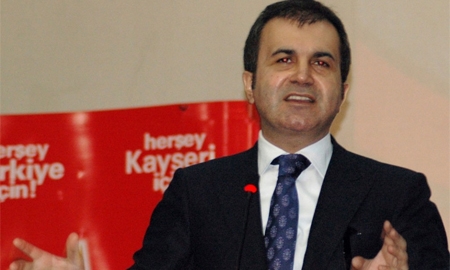
On 3 November 2002, Recep Tayyip Erdoğan's newly formed AK Party swept to power on the wave of widespread popular support, heralding a new age of reform for Turkey. The centre right conservative party secured a majority by winning over two thirds of the available parliamentary seats. Sitting here with Mr. Ömer Çelik himself an elected AK Party official, it is not difficult to understand how this wind of change blew so easily through Turkey. In a time when Europe's economic and political crises are well documented, Turkey can count itself lucky and be heartened that currently and above all else they have in the ruling AK Party a party that has a conviction and a singularity of purpose in what it wants to achieve for Turkey and also in how it wants to achieve these aims.
Listening to Mr. Ömer Çelik one cannot help but wonder at how far this party has come from its origins in 2001 as a party which aimed to unite and respect the views of religious and business factions alike, bringing together a fractured electorate which previously suffered from a rural-city style divide. The AK Party campaigned as a party to represent the various classes across the political divide and not just for the elite within Turkish society. They heralded a new and fresh approach to Turkey's problems through forward thinking economic and social reforms. These economic policies and reforms subsequently proved their worth in taking Turkey from the clutches of hyperinflation and the brink of an economic abyss, in the wake of the Turkish financial crisis in 2002, to being one of the world's top performing economies. The AK Party also adhered to its mandate as a party to preserve an Islamic style democracy built on free trade and liberal open markets whilst respecting religious sensitivities and Turkey's ingrained secularist culture which dates back to the founding of the state by Mustafa Kemal Atatürk in 1923. Indeed, fast approaching the 90th anniversary of that famous occasion for Turkey I stopped with Mr Ömer Çelik to reflect on Turkey and the AK Party, past and present.
As we sit in the headquarters of the AK Party, Mr. Çelik reflects on what has been a very trying year for politics in the Arab world. He comments that if one were to draw a line through the Mediterranean, above that line you would see Europe reeling from its debt crisis while below the line there exists a crisis of leadership and political systems in the Arab world. For some perhaps the Arab Spring uprisings may have come as something of a shock. However Mr. Çelik points to a combination of factors which eventually resulted in the fall of certain governments. One of these factors he states as being the coming to power of the AK Party. He relates how the successful implementation of an Islamic style secular democracy highlighted the possibilities open to neighbouring countries. The fact that watching Turkey's rise within the region and on a global stage acted as a spark for action in neighbouring countries is beyond dispute. Whether they have the foresight, vision and correct policy strategy which the AK Party displayed remains to be seen.
This brought our conversation around to Turkey, her foreign policy under the AK Party and her role in the region. Turkey, without doubt, is seen and acts as a regional leader. Looked to as an example of all that is possible by surrounding countries, Turkey plays a pivotal and leading role in trade, commerce and international relations in the region. Mr. Çelik comments on Turkey’s unique position. He explains “We are a Mediterranean country, a Middle Eastern country, a European country and a Balkan country.”
Turkey is not only a geographically significant meeting point; it is also the meeting point for “East” and “West” in terms of values. With this in mind Mr. Çelik points to Turkey´'s and the AK Party's goals for the region. Mr. Çelik says that Turkey is using its influence to establish more security and stability in the region. This mission is something that only Turkey has the necessary diplomatic abilities to realize and that Turkey will not use this opportunity to enrich itself but to help enrich and improve conditions for its neighbours.
So what lies ahead for the AK Party and Turkey? The question of Europe and EU membership looms large on the horizon. A sigh, an intake of breath, a topic that weighs heavy not just in this room but all across Turkey. Mr. Çelik explains his own view. Turkey has officially been in negotiations to join the EU officially since 3 October 2005. It has had a Customs Union agreement with the EU since 1995.
Mr. Çelik highlights his disappointment at what he feels is a use of double standards in measuring Turkey's bid to become an EU member. He cites fulfilment of Maastricht Treaty criteria by Turkey as opposed to non-fulfilment of the same treaty by actual and aspiring member states, and also points to how Turkey's negotiations have stalled and are stop-start in nature in comparison to the negotiations with other countries, which despite having starting later than Turkey, have already been successfully concluded, as examples of Europe's double standards. While there are a lot of viewpoints and pending discussions on this particular debate Mr. Çelik does make one crucially important point. The European Union with Turkey as a member will have a sphere of influence stretching right to the East Mediterranean and Black Sea coasts, the Middle East, the Caspian Sea basin and Central Asia, instantly making Europe a formidable global geostrategic player. Mr. Çelik, the AK Party and Turkey are thinking global and he challenges the EU to do the same.
0 COMMENTS